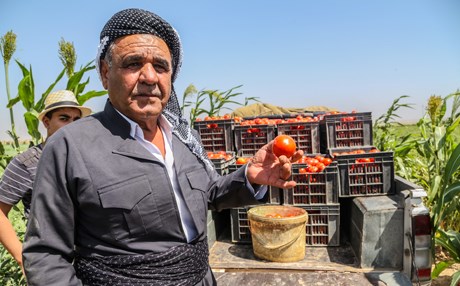Omar Mehedin stands in his tomato field about 40 kilometers outside Erbil. His tanned face bears the evidence of two decades of farming and tilling the land.
“It’s a difficult job, but that’s my profession. The only thing I can do,” he says.
Better seeds and more advanced techniques have meant better harvests over the years. But this year, there was a new problem. Heavy rains.
Winter and spring are the traditional wet seasons in Kurdistan, but too much rain is harmful for the tomato plants, Mehedin explains, pointing to browned leaves and discoloured tomatoes destroyed by this year’s heavy rains that also killed four people and damaged many homes.
Experts predict that the spring deluges will become more common – an outcome of climate change.
As temperatures climb, evaporation increases and puts more pressure on lakes and rivers – forcing farmers to increase their irrigation.
Another aspect of global warming is changes in the pattern of rainfall, which is a major concern in Kurdistan, explained Dr. Ali Hassanli, associate professor at the Natural Resources Engineering and Management department of the University of Kurdistan-Hawler (UKH).
In the past, precipitation fell with less intensity and over longer periods of time. There was also more snow in the mountains, which melted and fed lakes and rivers and increased the amount of groundwater.
Now, there is less snow and the rain is more intense like what Kurdistan experienced this spring. Deforestation on the other hand makes the land less stable and unable to absorb the rainwater, which as a result causes erosion of fertile soil.
The ideal situation, explained Hassanli, is for water to come slowly and be used slowly.
o counter water problems, Mehedin installed a drip irrigation system on the 25 acres of farmland he leases. Drip irrigation allows him to send the water directly to each individual plant and prevent evaporation. It is more ecologically friendly than sprinkler or surface systems.
Thin pipes line Mehedin’s tomato field and run close to the stems. He turns on the tap three times a week and lets water drip out of holes spaced 10 cm apart for five hours at a time.
To further reduce evaporation Mehedin waters his fields at night during the summer. The water comes from a well dug on the land.
He learned about the system from Turkish and Iranian companies operating in Kurdistan and was won over by the conservation of water, lower costs, and ease of use.
With drip irrigation, says Mehedin, he can cultivate more land and get a better product.
The Kurdish government (KRG) is promoting agriculture as a means to increase self-sufficiency, boost the economy, and replace oil and gas. This simply means more demand on water.
Poor water management at home and a developing dispute over cross-border rivers also leave their impact on the situation in the Kurdistan Region.
The Middle East and North Africa region (MENA), already an inherently dry zone, has been in a severe drought for at least seven years.
“Sadly, the MENA countries are the least prepared for that challenging issue,” said Hassanli.
The Middle East must adapt, he said. Governments must manage the resource properly, educate the public about protecting and conserving water, and promote sustainable agriculture of crops that need less water.
Nature can control itself, said Hassanli. Humans just need to learn to understand and respect the natural systems.


